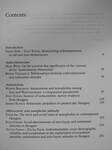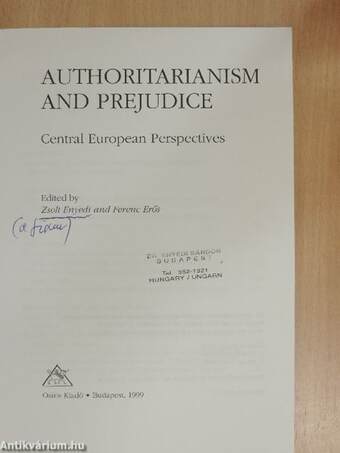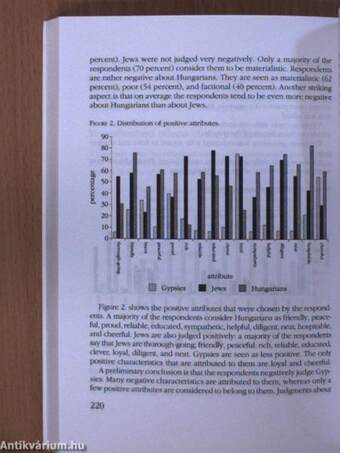1.076.483
kiadvánnyal nyújtjuk Magyarország legnagyobb antikvár könyv-kínálatát

VISSZA
A TETEJÉRE
JAVASLATOKÉszre-
vételek
Authoritarianism and prejudice
Central European Perspectives
| Kiadó: | Osiris Kiadó |
|---|---|
| Kiadás helye: | Budapest |
| Kiadás éve: | |
| Kötés típusa: | Ragasztott papírkötés |
| Oldalszám: | 306 oldal |
| Sorozatcím: | |
| Kötetszám: | |
| Nyelv: | Angol |
| Méret: | 20 cm x 14 cm |
| ISBN: | 963-379-707-1 |
| Megjegyzés: | Fekete-fehér ábrákkal. |
naponta értesítjük a beérkező friss
kiadványokról
naponta értesítjük a beérkező friss
kiadványokról
Fülszöveg
There is consensus on the relevance of authoritarianism and racism in the social and political life of European societies, but there have been few attempts at combining the knowledge gained from empirieal research done in both new and old democraeies of the continent. The book "Authoritarianism and Prejudice: Central European Perspectives" is a truly international enterprise which aims at answering the following questions: How can we measure authoritarianism, ethnocentrism and prejudices? In what way authoritarian and nationalist attitudes are combined with political and ideological affiliations? Are attitudes like antisemitism and anti-Gypsy sentiments similar or have they a different structure and logic? Can we explain prejudice and authoritarianism by referring to the impact of status, religion and education? Are new generations less or more xenophobic than their parents? Can we regard extreme right wing parties as transitory phenomenon, or are they likely to stay with us?... Tovább
Fülszöveg
There is consensus on the relevance of authoritarianism and racism in the social and political life of European societies, but there have been few attempts at combining the knowledge gained from empirieal research done in both new and old democraeies of the continent. The book "Authoritarianism and Prejudice: Central European Perspectives" is a truly international enterprise which aims at answering the following questions: How can we measure authoritarianism, ethnocentrism and prejudices? In what way authoritarian and nationalist attitudes are combined with political and ideological affiliations? Are attitudes like antisemitism and anti-Gypsy sentiments similar or have they a different structure and logic? Can we explain prejudice and authoritarianism by referring to the impact of status, religion and education? Are new generations less or more xenophobic than their parents? Can we regard extreme right wing parties as transitory phenomenon, or are they likely to stay with us?
Hungárián, Dutch, Yugoslav, Austrian, American and Germán scholars offer answers to these questions by looking at surveys and political documents from a number of countries. There is a special emphasis on the lessons learned from quickly transforming and turbulent Central Europe. The readers are offered a systematic evaluation of the causes of ethnic hatred; an overview of the development of sociological and social psychological literature on the topic, particularly the studies emanating from the famous work by Adorno et. al., The Authoritarian Personality. There is a comparative evaluation of nationalism and authoritarianism among such groups as Eastern and Western Germans, Serbs and ethnic minorities in Yugoslavia, the religious and the atheists, the rich and the poor, the educated and the non-educated in a number of European countries. The papers include data analyses and methodological discussions that may benefit, first of all, university students, but the book offers new and revealing information for anyone interested in the mechanisms and the explanations of ethnic intolerance. Vissza
Témakörök
- Történelem > Társadalomelmélet
- Szociológia > Társadalmi csoportok > Kisebbségek > Cigányság
- Szociológia > Társadalmi csoportok > Kisebbségek > Zsidóság > Antiszemitizmus
- Szociológia > Politikai szociológia
- Szociológia > Szociálpszichológia
- Idegennyelv > Idegennyelvű könyvek > Angol > Szociológia > Társadalmi csoportok > Kisebbségek > Cigányság
- Idegennyelv > Idegennyelvű könyvek > Angol > Szociológia > Társadalmi csoportok > Kisebbségek > Zsidóság > Antiszemitizmus
- Idegennyelv > Idegennyelvű könyvek > Angol > Szociológia > Politikai szociológia
- Idegennyelv > Idegennyelvű könyvek > Angol > Szociológia > Szociálpszichológia
- Idegennyelv > Idegennyelvű könyvek > Angol > Történelem > Európa története > Magyarország története
- Idegennyelv > Idegennyelvű könyvek > Angol > Történelem > Európa története > Egyéb
- Szociológia > Magyarországon
- Szociológia > Tanulmányok, esszék
- Idegennyelv > Idegennyelvű könyvek > Angol > Szociológia > Magyarországon
- Idegennyelv > Idegennyelvű könyvek > Angol > Szociológia > Tanulmányok, esszék
- Történelem > Idegennyelvű > Angol
- Történelem > Magyarország története és személyiségei > Átfogó művek, tanulmányok
- Történelem > Politika > Politikai rendszerek
- Történelem > Politika > Ideológiák > Nacionalizmus
- Történelem > Tanulmányok
- Történelem > Kontinensek szerint > Európa, európai országok története > Közép-Európa > Egyéb
Megvásárolható példányok
Nincs megvásárolható példány
A könyv összes megrendelhető példánya elfogyott. Ha kívánja, előjegyezheti a könyvet, és amint a könyv egy újabb példánya elérhető lesz, értesítjük.












